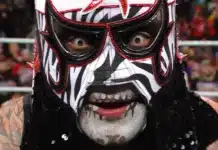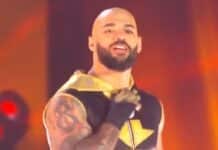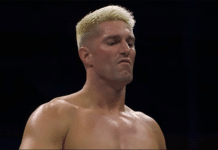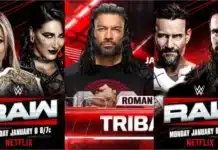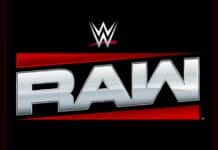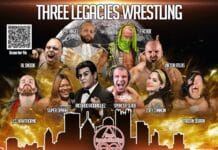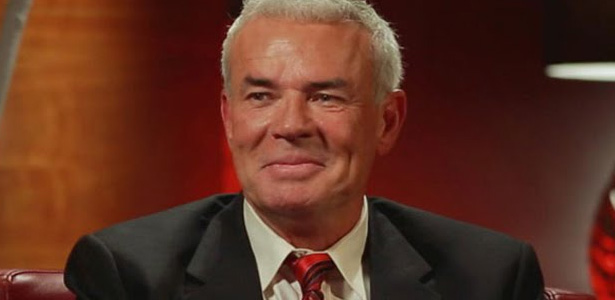
This past week on AEW Dynamite, Eric Bischoff, the former president of WCW, returned to the TNT network for the first time in twenty years as he was the guest moderator for the Chris Jericho and Orange Cassidy debate. I’m sure some of the immediate reaction was “oh no” because any affiliation with WCW is somehow frowned upon in the modern era, despite the fact that the existence of World Championship Wrestling and more specifically, some of the influence that Bischoff had made it possible for the Monday Night wars that those same fans view as perfect through a nostalgic lens. While Bischoff did fine in his role, it seemed like a rather random spot for him, especially considering his history with the network. So, was this a one-off or could the former Raw General Manager bring more to the table for AEW?
In truth, since the winners usually write the history books, Bischoff and WCW as a whole don’t get the credit they deserve from the narrative that WWE pushes toward a main stream audience through its documentaries. At the same time, Bischoff’s view point that he expresses regularly on his podcast, 83 Weeks, is obviously slated to paint him in a better light than is necessary. So, similar to basically anything else, there’s two perspectives on a story and the most accurate history probably lands somewhere in the middle. The Turner organization’s success wasn’t just because Bischoff could freely use Ted’s check book and sign talent that were already established stars in the WWF. If that were the case, fans wouldn’t have been chanting “Hogan sucks” in 1995 when his tired routine was rejected by the audience. On the flip side, it was the presentation of those athletes, including how Bischoff portrayed the New World Order at the time. Keep in mind, Eric didn’t buy the rights to Razor Ramon and Diesel, he signed Scott Hall and Kevin Nash to contracts. The value to the names Hall and Nash in the late-90s were because of how they were presented on television in that era. If Bischoff didn’t pitch an angle that got noticed, the names Hall and Nash wouldn’t have picked up steam at a time when most performers’ real names weren’t easily accessible on the internet.
.@EBischoff has arrived and is your special guest moderator in this debate!
Watch #AEWDynamite NOW on @TNTDrama or https://t.co/GdI7QAsxEP for our International fans. #AEWonTNT @AEWonTNT pic.twitter.com/PeXshzvgQT
— All Elite Wrestling (@AEWrestling) August 6, 2020
On the other end of the spectrum, Bischoff isn’t totally blameless for the downfall of WCW either. In fact, for a promotion to completely tank almost as fast as it ascended, there’s enough blame to go around for many people. The chaos within the corporate structure and the lack of control of the product at certain points probably falls on his shoulders. But, the infamous, “it don’t work for me, brother” was probably a bigger factor in the promotion’s inability to solidify any other talent for the future. Furthermore, if there’s one particular reason the company fell off a cliff in the year 2000 and went out of business a few months later, it’s the absurd writing of Vince Russo, who was the lead writer for the group during most of the year where it lost $60 million as an organization. As much as the AOL/Time Warner merger sealed WCW’s fate, it’s not difficult to understand why an executive would want to get rid of an entity that lost the corporation $60 million in a year. The bottom line is, if WCW was making money, it wouldn’t have been sold to Vince McMahon for pennies on the dollar.
The point being is that Bischoff’s legacy within professional wrestling is complex, to say the least. His work as GM in the early-2000s was really good stuff and he was involved in many of the memorable moments of that era. There was also the infamous TNA stint that everyone, including Bischoff himself, want to forget. More recently, he was hired as the head of creative for Smackdown ahead of its move to Fox as a part of WWE’s mega TV deals last year, but was fired from the position three months later. Similar to how Paul Heyman was moved from the Raw writing team because of the sluggish ratings due to the pandemic, Bischoff basically took the fall for the ratings on Fox last year. Eric definitely has and deserves his critics, but it’s obvious that he wasn’t really given a chance to do much with the Smackdown brand if he only had a three month tenure.
At 65,one might assume that Bischoff’s involvement with the industry, aside from his podcast, might be near its conclusion. However, because of the WWE spin that is put on much of the late-90s era, sometimes it’s often forgotten that Eric is a tremendous television performer. That being said, I think it might actually be beneficial if we saw one last Bischoff run as a TV character, and it would give him a better exit from the industry than getting sandbagged for the Fox ratings. Ironically, his best fit in AEW might also involve Jericho, who brought him into the storyline as the guest moderator. The Inner Circle has really shined on Dynamite because despite seeming like a random stable on the surface, the members are so talented and have worked together very well. Plus, just as it was designed to do, Jericho’s association has elevated the others in the stable. As I’ve written many times before, Jericho has put himself in a league of his own in many ways the past few years with his work in New Japan and AEW.
Granted, I know there are five members of the Inner Circle, but follow me on this, the only thing the group might be able to add an extra emphasis on it would be a JJ Dillon type of figure for the role he had with the Four Horsemen. I could see using the negative perception of WCW to get heat with the AEW audience because it takes the WWE spin of the narrative and uses it to infuriate the AEW crowd, who have been told for almost two decades that Bischoff was one of the main reasons that the alternative to WWE collapsed. Perhaps the only thing, if anything, that is missing from the Inner Circle is major heat, which isn’t a jab at their act, but rather the state of the industry. The group is so solid and so entertaining, it’s somewhat difficult to really get heat from the audience. Could you imagine the reaction to Bischoff on the mic in front of a diehard AEW crowd?
“Why does this rematch mean so much to both of you” – @EBischoff.
Watch #AEWDynamite NOW on @TNTDrama or https://t.co/GdI7QAsxEP for our International fans. #AEWonTNT @AEWonTNT pic.twitter.com/84ZxCcoPAo
— All Elite Wrestling (@AEWrestling) August 6, 2020
The logic for Bischoff’s involvement is that he can claim that he brought pro wrestling to TNT and that AEW is trying to takeover his legacy. Again, it uses the perception of the narrative about WCW and it’s association with TNT to get heat from the AEW demographic. Obviously, Bischoff’s role should be strictly as a TV character and not within management, but he could still bring value to the table.
Well, we weren’t expecting that from @orangecassidy. The more you know.
Watch #AEWDynamite NOW on @TNTDrama or https://t.co/GdI7QAsxEP for our International fans. #AEWonTNT @AEWonTNT pic.twitter.com/Z1aUNtMUVB
— All Elite Wrestling (@AEWrestling) August 6, 2020
As far as the Jericho/Orange Cassidy feud, I really think that at the conclusion of this angle, the pieces will be assembled to make Cassidy a much bigger star than he was previously and prove any critics wrong in the process of it. Sure, he has a gimmick that has to be portrayed careful so it doesn’t get overused or stable, but the bottom line is, he has the talent to be a major star for the company and this could be the path to it. Again, this is Jericho helping to make new stars, which is a credit to his ability as a performer. Don’t get me wrong, AEW isn’t perfect and not every segment is a home run, but if you rewind to the previously mentioned Attitude era that many people think was flawless, not every segment was perfect in the late-90s either. Nitro had a few of those Jerry Flynn vs. Disco Inferno matches, while Kurrgan was dancing on Raw. The point being, AEW is making progress as a promotion, even during the pandemic and that’s a good thing, especially because its success benefits the entire industry.
What do you think? Comment below with your thoughts, opinions, feedback and anything else that was raised.
Until next week
-Jim LaMotta
E mail [email protected] | You can follow me on Twitter @jimlamotta

